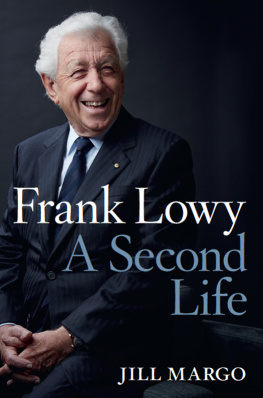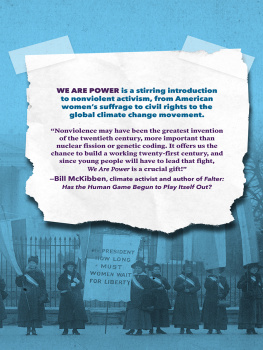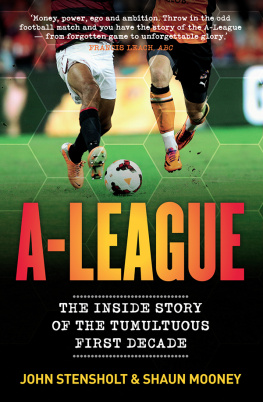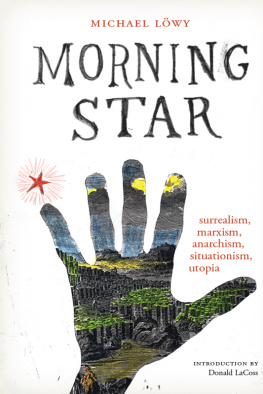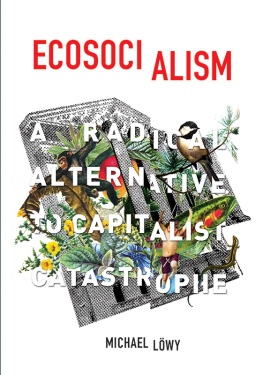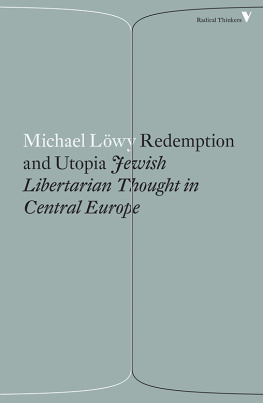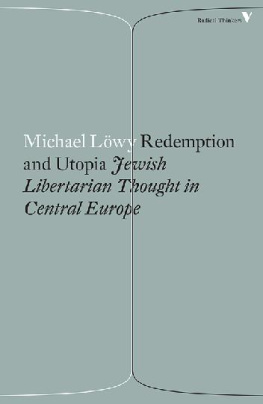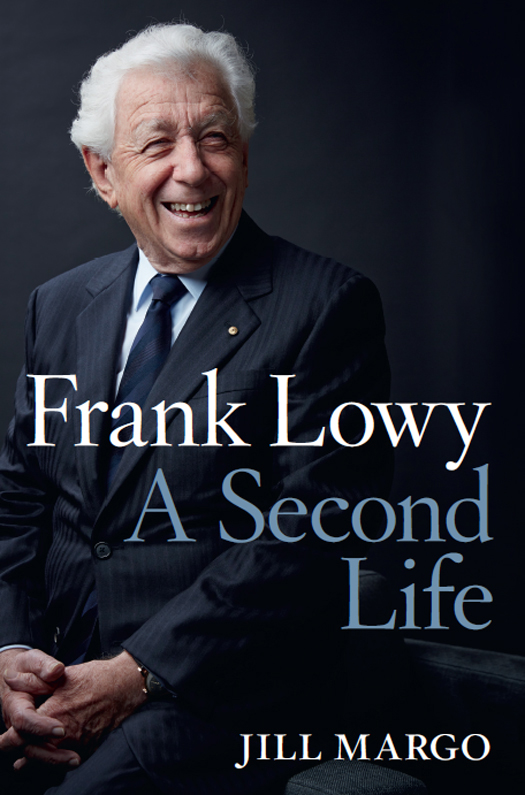HarperCollinsPublishers
First published in Australia in 2015
by HarperCollinsPublishers Australia Pty Limited
ABN 36 009 913 517
harpercollins.com.au
Copyright Jill Margo 2015
The right of Jill Margo to be identified as the author of this work has been asserted by her in accordance with the Copyright Amendment (Moral Rights) Act 2000.
This work is copyright. Apart from any use as permitted under the Copyright Act 1968, no part may be reproduced, copied, scanned, stored in a retrieval system, recorded, or transmitted, in any form or by any means, without the prior written permission of the publisher.
HarperCollinsPublishers
Level 13, 201 Elizabeth Street, Sydney, NSW 2000, Australia
Unit D1, 63 Apollo Drive, Rosedale, Auckland 0632, New Zealand
A 53, Sector 57, Noida, UP, India
77-85 Fulham Palace Road, London W6 8JB, United Kingdom
2 Bloor Street East - 20th Floor, Toronto, Ontario M4W 1A8, Canada
195 Broadway, New York, NY 10007, USA
Margo, Jill, 1954- author.
Frank Lowy: a second life / Jill Margo.
ISBN: 978 0 7322 8778 8 (hardback)
ISBN: 978 0 7304 9735 6 (ebook)
Includes index.
Lowy, Frank P., 1930
Lowy Institute for International Policy.
Directors of corporations Australia Biography.
Successful people Australia Biography.
Success in business.
Immigrants Australia Biography.
338.092
I should tell you straight up that I am an admirer of Frank Lowys and, even if I were not, I would still be fascinated by him.
When I had to move house in what people call my advanced years, but did not want to lose the extensive library I had built up, Frank Lowy generously funded the relocation of the library to the Sydney Mechanics School of Arts in Pitt Street. The ambience of the original was recreated and it now serves as a public library. Such examples of Lowys generosity are so common that there would not be room in this book for all of them.
But I am not writing this because of that previous benefaction. That is not why I enjoyed A Second Life or why I admire the gifts of narration and research Jill Margo brings to it. I read it so enthusiastically in part because Lowy seems to me to be an escapee from some phenomenal novel. Unlike Lear, he is no mad old king. Unlike the Buddenbrooks of Thomas Manns famous novel, his adaptability and acumen mean that his fortunes, and those of his family, abound rather than decline. He has more appetite for life than any single man can hope to satisfy, and he is not finished trying to do so yet. In his case, as Margo says, drive has not dissipated to create a philosophic old man in an easy chair. But he does assess himself, which makes him very interesting. He is not a man of blunt-force, callow ambitions. There are moments when he looks back gratefully on his long years with Shirley, on his family un-fractured by conflict, and on his significance in the community of Australians. There are also moments when he assesses himself and others more critically. Lowy is a refugee who has shaken lifes tree. No branch has been safe. Such achievements, of course, are not accomplished without some grief. But Lowy has been throughout his life extraordinarily gifted at absorbing punishment without being deterred from what can justly be called a spectacular course.
Interestingly, Australians as a whole have found it fairly easy to be sympathetic to Lowy; even those who are not tend to be fascinated by him. From the time he first arrived in Australia and took a job as an ambitious delivery truck driver, he has had a capacity to engage with us. As this book demonstrates, Lowy is self-reflective in a way Australians are not used to seeing in their oligarchs. He has achieved what most rich people cannot in Australia: the regard of the punters. With a few notable exceptions, in Australia wealth tends to go to people without a tradition or onus of endowment, and without a tradition of inner self-assessment and self-judgment.
I commend Jill Margos book to you as one which deals with the complexity, the enigma, the muscular vision and wisdom of Frank Lowy. I enjoyed it. May you as well!
Tom Keneally
My previous biography of Frank Lowy, entitled Pushing the Limits, was published in 2000. This second biography begins where that one ended. Then, he was approaching his seventieth birthday and was widely expected to retire. As this book shows, he never did.
Frank Lowy is an intensely private man. For the first book he resisted his natural inclination and allowed me to see something of what lay behind his public face. Since nothing bad came of that, for this book he allowed me to see more. I have tried to respect his trust while telling the story of his mature years as fully as I can.
For those who never read the earlier biography, I have summarised it in the initial fifty pages of this book and called it The First Life.
Having now written more than a quarter of a million words on Frank Lowy, I have nothing more to say except to thank him, most sincerely, for the uncountable hours he spent talking to me.
Jill Margo
Contents
Guide
In 2003, the stars were aligned for Frank Lowy. This was the year he turned seventy-three, and the year he made three decisions that would alter the course of his life. While he continued at the helm of Westfield, which was in a growth phase, he took on three unrelated new pursuits. These were not for commercial gain or charity: these were passionate matters of the heart. He ran these activities in parallel to his business life, as if he was growing a second life alongside his first. When he stepped out of his executive role at Westfield, it was seamlessly into this other life.
Those close to the older Frank describe him as an alloy of warm understanding and steel that can freeze to the touch. They say people who experience only the understanding Lowy find it difficult to imagine the toughness within him, just as those who cross him find it difficult to imagine he is capable of compassion.
A complex character, Lowy is both generous and has a strong sense of entitlement. With his level of wealth he is expected to be philanthropic, and he is, but in business he never shies away from taking his full share and perhaps more. His style is to cut off questions about the large salaries the family draws from the business by saying, Were worth it. He never has a problem looking after his own and expects others to do the same. If they stand around waiting to be recognised they could wait a long time. While he admires strength and self-reliance, weakness makes him uncomfortable.
The Dutch press once tried to explain him to their readers. After a high-profile commercial battle in Holland in 2002, the publication FEM de Week described him as a short man who mostly had a smile on his face. While he was charming, modest, thoughtful and not a shouter, it said, he can be as hard as nails if he considers it necessary for business. As a landlord he has no sympathy for retailers and resists legislation that is intended to provide shopkeepers with more protection. But in person he doesnt give the impression of being a shark; he is approachable and modest in a way one seldom sees in people at his level of business.
When Lowy was in his early seventies, an Australian newspaper columnist described him as being as fit as a mallee bull. But when he looked around the city he was almost alone. Most of his contemporaries were no longer there and it was largely the presence of his three sons in the business that kept loneliness at bay. David, Peter and Steven also kept him up to date. All three were in their forties, all had extensive experience at Westfield, and their mutual respect got them through the inevitable family tensions.

